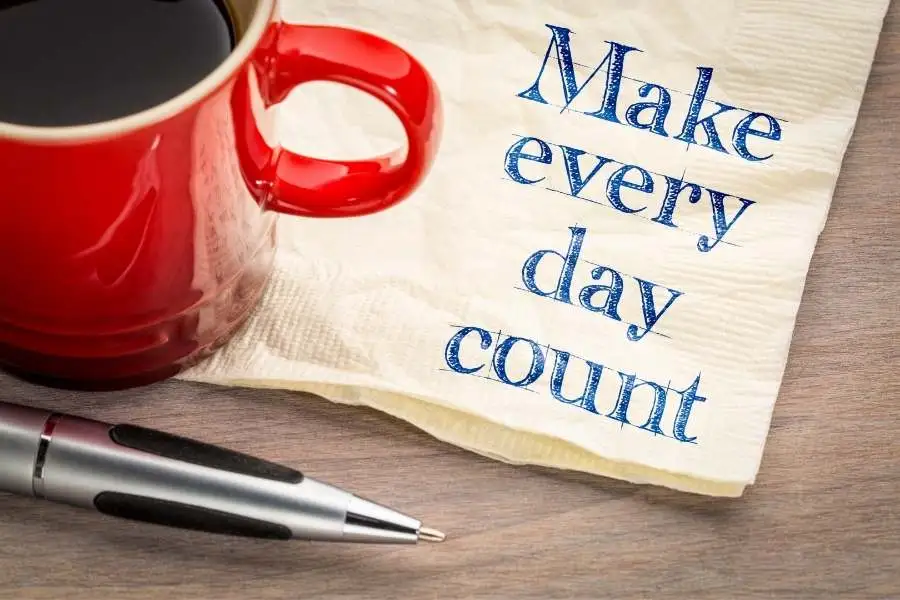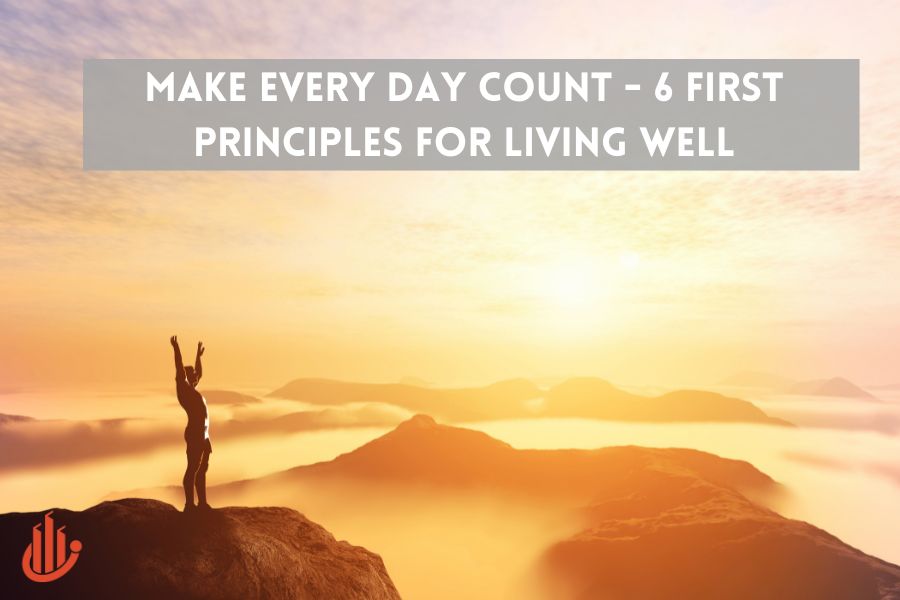The phrase “Make every day count” has become a popular catchphrase shared over social media platforms such as Facebook. Often, this phrase is accompanied by a photo of someone in a meditative state and accompanied by an inspirational quote attributed to figures like Albert Einstein, Elon Musk or Steve Jobs.
In other words, the phrase elicits a sense of bravado: one that makes individuals appear to be possessing all the power in their hands. However, on closer inspection its meaning tends to be nebulous and uninspiring; it is essentially nothing more than an eye-catching flourish used for rhetorical effect. Despite this – or perhaps because of it – there is no discernible shift towards its application as life philosophy or any reality of real-life implementation whatsoever.
“How we spend our days is, of course, how we spend our lives.” – Annie Dillard
Many individuals take to social media to compare themselves to their peers, often spending extended amounts of time scrutinizing their less-than-flattering image. It is imperative to practice living in the moment and seize the day for what it is worth.
In this article, I aim to offer a straightforward definition of what it means to make every day count. I will provide foundational principles that anyone can utilize to improve their daily lives. Through this blog post, I will take a no-nonsense approach to describe the concept of making each day meaningful.
What Makes a Day Count?
In order to gain insight into how to make the most out of each day, one must consider what constitutes a successful day. What can be done to create an experience that provides satisfaction and a sense of accomplishment? To answer these questions is to begin the journey toward optimizing our days and making them truly count.
Every individual has their own idea of what constitutes a successful day, but there are six criteria that tend to be universally accepted as integral to making a day count. These criteria include:
- Individuals no longer need to spend prolonged periods of time engaged in activities they do not enjoy.
- Engaging in a flow state activity, which involves dedicating time to a passion or hobby, can be a rewarding and beneficial experience.
- You had full control over where you were
- You got to choose who you were with
- You did something important
- You were in control of your mental state

While physical health is an important factor in overall well-being, this article will focus on the aspects of mental and emotional health that individuals can take direct control over through their choices and actions. Specifically, this includes managing one’s thoughts and emotions (number 6) as well as other factors such as career, relationships, and self-care.
Research has demonstrated that a perfect day consists of avoiding activities that one may dislike, engaging in preferred ones, having full autonomy over the environment, accomplishing something meaningful and maintaining control of one’s mental state. Examining the fondest memories, this appears to be a reliable notion.
So – How Do You Actually Make More Days Count?
With a clear idea of how to create fulfilling days, the question now arises: what measures can be taken to ensure that such days are more commonplace? What strategies can be employed to maximize the potential for meaningful experiences on a daily basis?
In order to identify any impediments to a successful day, it is necessary to analyze the criteria outlined previously. By doing so, we can determine possible roadblocks that prevent good days from occurring.
It is important to identify what factors lead to having productive days in accordance with pre-established criteria. Here is the first criterium:
1. On a day that counts, don’t spend a lot of time doing things you hate
Navigating through the difficulties is a piece of cake from this point onward.
For many individuals, their work is a source of frustration; conversely, remaining in that position would inevitably lead to fewer days which feel as though they truly matter. The prevailing perception of being trapped inside an unfulfilling office job is antithetical to the make every day count principle. For this particular person, seeking another occupation or taking on self-employment will be considered priority – if not the #1 choice!

Don’t spend time doing things you hate
To make sense of this conundrum, consider asking yourself: What detestable task are you helplessly compelled to undertake? And how can you limit its frequency?
When attempting to respond, you will likely be limited by your existing convictions. You may conjure up many answers, such as ‘I detest performing X action but feel compelled to do so because of Y rationale’.
If you find yourself unable to address the question ‘How can I do less of these?’ with a feasible response, don’t despair! Remember: imagination is key. If your answer comes up with something impossible – perhaps due to a lack of knowledge in achieving it – then simply develop an understanding and adapt accordingly.
To begin with, let me reiterate that sometimes distasteful tasks must be undertaken in order to attain lofty objectives. We will examine this matter more concretely on Point 5 but for now please bear in mind that there is often an equilibrium between rigorously pursuing grandiose ambitions and tackling arduous undertakings. Doing some difficult actions along the way may necessitate making some unpleasant choices – however, ultimately these decisions should not deter you from achieving your goals!
Ultimately, the key is to ensure that if you have to do things you detest, this does not adversely impact other aspects of your day. For instance, if cold-calling is an unpleasant task but ultimately helps launch your dream enterprise or provide liberation from a soul-crushing job; then it’s potentially an invaluable endeavour in comparison with simply remaining where one presently finds oneself. There are multiple interdependencies at play between both criteria when considering which activities may qualify as tolerable for daily routine maintenance.
2. On a day that counts, spend a lot of time doing things you love (a “flow state” activity)
For those in the know, a flow experience is an intense state of immersion that can be likened to being enveloped within an activity. Your perception change: you find yourself perceiving time as fleeting and perceive each moment as if it were unfolding with immutable inevitability – like watching the Matrix, only able to comprehend what happens next based on intuitive knowledge rather than understanding where things are leading from one step ahead.
For many individuals, playfulness and exertion typically go hand-in-hand – after all, it is often enjoyable to engage in activities that require proficiency or mastery. To experience a flow state successfully, however, one must be proficient at an activity enough to not make unnecessary blunders – even if the act of playing itself can be quite exhilarating!
I have carefully selected this as the standard for assessing my endeavors; whereas exhilarating pursuits may be enjoyable, without requiring any effort, I believe that there is an essential qualitative distinction between those which provide enjoyment and those which genuinely induce states of flow-like consciousness – the former can often become addictive or detrimental while the latter invariably assist in guiding us towards our most meaningful undertakings.
Put simply, it is an activity that both pleases you and is beneficial to your health. If it also benefits those around you, this provides a double advantage (point 5 discusses this in detail).
So, how can you ensure that more of your days are laden with these exhilarating high-points?
Perhaps, it may be necessary to unfetter more time from your workload, or perhaps cutting down the hours you spend at work could be an effective solution.
However, it is often a simple choice to devote more time to activities that foster flow such as meditative reflection or engaging in creative pursuits. Many people possess the potential for adding at least an hour each day by scrutinizing their time and pruning away the superfluous endeavours – locating where wasted hours are percolating away.
Furthermore, proficiency is a prerequisite for attaining flow states; if your current skill set is insufficient to achieve them then you must be prepared to become mediocre during the learning process.
3. On a day that counts you have full control over where you are
On a macro scale, this can mean having absolute control over the nation, city or town in which you reside on any given day. It could also potentially function as an opportunity to make choices regarding where one chooses to reside and may even be utilized as a means of relocating between locations should that particular desire arise.

On a microscopic scale, it refers to where you are in your local community – be it an office building or the beach; a classic example.
How can you achieve greater mastery over where you reside on any particular day?
The implications here will depend upon the quality of your present living circumstances, as well as where you would like to reside.
If you find yourself disliking your city or yearning to escape its confines, then the prospect of being agile and mobile may be more alluring than ever. In this situation, it is imperative that you make some modifications to your lifestyle; reducing the number of possessions left in one’s possession space should yield a lighter step when moving around town. Furthermore, finding ways that provide funding for such mobility must also be considered – perhaps as an alternative mode of travel.
Alternatively, you may wish to explore the possibility of a year working or studying abroad in one location.
Despite being content with where you reside, it is imperative to spend a considerable amount of time in an environment that may not be ideal – such as your abode or workplace. It may therefore become necessary to alter current habits and develop priorities such as shifting residences or altering one’s job so that 80% of the time can be spent elsewhere.
Contrary to widespread belief, starting an online business does not necessitate spending all your time sunbathing on the beach. I can attest from personal experience that beaches are most unsuitable locations to try and work on a laptop; even if you opt for location independence as your approach, you will still need to devise a plan for workspace organization if travelling across multiple countries.
4. On a day that counts, choose who you spend time with
As far as importance is concerned, this criterion must rank among the most vital factors.
The quality of your existence hinges on the caliber of people who surround you, and the strength of your connections with them. To a great extent, life is about others; it’s all about relationships.
If life is getting on top of you, chances are work and living situations may be to blame. There could be an irritating boss or infuriating co-workers -or perhaps youre in a cramped apartment with roommates who continually find fault with everything! The first step toward rectifying this situation is determining the people that suit your lifestyle best; then devise a plan for optimizing it so that you can live happily ever after!
If you’re putting in 80 hours a week and neglecting your family, friends or significant other – this is an obvious decision. It doesn’t take much convincing to realize that priorities are misaligned.
Indeed, there is an unavoidable attendant consequence to prioritizing certain pursuits (point 5): the need to be judicious regarding time spent with those who are dear to you. Ultimately, it is essential that you have a realistic appreciation of opportunity costs – what one relinquishes by choosing another course of action.

Time is a precious commodity, and life inevitably brings its share of challenges. Though it may be hard to comprehend just how quickly time can slip away – all too often, we fail to appreciate the fleeting nature of our bond with those closest to us.
As Paul Bowles wrote in The Sheltering Sky:
“How many more times will you remember a certain afternoon of your childhood, some afternoon that’s so deeply a part of your being that you can’t even conceive of your life without it? Perhaps four or five times more. Perhaps not even. How many more times will you watch the full moon rise? Perhaps twenty. And yet it all seems limitless.”
Investing time in the lives of those who matter can be an enticing prospect, but it is important to recognize that there are indeed limits to this precious resource. Time itself is fleeting, and as such cannot be squandered without consequence.
This is essential for ascertaining the priorities of your life. Assessing all that needs to be done juxtaposed with how you can spend time with your offspring could appear an equitable swap; however, overestimating how much time can be made up, later on, may give rise to a false sense of security in one’s decision-making process.
Undeniably, selecting when to be alone is vitally important. Similarly, cultivating solitude is essential in attaining a feeling of tranquillity.
5. A day counts when you do something important
Already, I have touched upon this topic multiple times, and it may be beginning to make sense with regard to what follows.
While it’s undeniable that variety is an important factor in selecting the best option for any individual, its worth noting that each person harbors a unique set of priorities and desires. Though, perhaps not as divergent as one might initially assume!

For me, the key takeaway from this experience is that much of what we consider important and worthwhile was likely programmed into us by society through cultural programming. Unless you have made ample efforts to contemplate your values and redefine them on an ongoing basis, it is highly probable that these priorities will inevitably become embedded in your subconscious mind – assimilated through osmosis! Consider every devotee who blindly fawns over the Kim Kardashians of our times as proof.
This is the one that requires a substantial amount of effort to comprehend. Understanding your preferences, dislikes, and haunts – even understanding who you prefer connecting with can be derived through intuition alone; however, deciphering what truly matters will require deep and thoughtful analysis.
If you are perplexed as to what is essential for your well-being, my counsel is simple: peruse.
For the sake of God, no; self-help books are a risky proposition at best. Most are laden with toxic influences which only reinforce mainstream ideologies and can be tackled by individual reflection – an endeavour that each person must undertake for themselves. However, there are sound thought-provoking voices out there who can guide you on your journey towards righteousness – whether through figurative language or example to inspire one’s sense of morality – in the most constructive way possible.
I’m focusing on fiction, and biographies.
The genius of fiction is a vital part of existence, the foundation for human connections and significance. Reading War and Peace or any other renowned classic will yield an exponentially greater amount of wisdom than whatever current bestseller might offer.
To gain clarity on what truly matters in one’s life, one should consider reading the autobiographies or biographies of people who have influenced them. By observing their values and taking lessons from these individuals’ lives can be a powerful way to align oneself with those ideals and become a model for future generations.
The sole proviso I would offer is that in order for something to qualifiy as essential, it should result in a more than just personal enhancement.
Indeed, taking some time out, unwinding and regaining inspiration are vital. Letting loose and having fun is also indispensable. These activities can be crucial to rejuvenating your batteries!
However, those activities are paramount insofar as they provide you with the requisite energy to tackle the essential objectives in life. Even after your demise, these endeavors will remain a legacy for future generations to admire and admirers always remember –
Are you embarking on any activity that will generate an echo?
The next essential step to ensure that you are engaged in important activities is to ensure your work is meaningful. This can be quite challenging if you find yourself entrenched in a lackluster job; however, it may necessitate retraining or a period of reacquaintance with study and learning new skills from scratch. To do so requires effort and concentration, making the journey sometimes arduous – but ultimately worthwhile!
Despite the overarching picture suggesting that a career shift may be necessary, dont let it become an excuse for inaction. Consider whether any goal youve been postponing recently is still important; can you spare five minutes today to take action towards accomplishing it?
6. A day counts when you‘re in control of your mental state
I wish to avoid dwelling on the ponderous subjects of debilitating mental illnesses and genetic predispositions that are beyond a persons control. This essay will focus solely on more accessible problems such as chemical imbalances and fluctuations within an individual’s genome.
By mastering your emotional responses, and exercising control over the stream of thoughts that occur in your mind on a daily basis, you can become masterful in observing yourself.

Can you subdue the clamor in your thoughts at will? Are you capable of detecting fallacious spirals and rebalancing them? Do you possess the ability to perceive when one repeatedly positions a frame, interpretation on reality, and judge how well it corresponds with what’s actually happening?
We have a unique perspective on life. Though we cannot dictate all its twists and turns, we always possess the power to shape our interpretation thereof.
Why is this important? Despite all the aforementioned criteria that can be ticked off during a single day, you can still convince yourself that your experience was somehow unsatisfactory.
If your mind continually droning on about negativity and you are unable to find a way out of it, then not only will your days be considerably less advantageous when all the above criteria are met; likewise, you may still dwell on these negative thoughts even when experiencing otherwise-excellent moments.
Real life provides you with raw material to derive inspiration from in the shape of your experiences. Extensive practitioners are adept at transforming even the most rudimentary incidents into a state of flow – an experience which can impart delight and contentment.
For those seeking to enjoy a vacation, there are those for whom ecstasy-infused snacks and unparalleled admission privileges to Disneyland might well be a turnoff.
How do you achieve this level of mindfulness? Meditation and yoga offer convenient references for cultivating an increased awareness, but anyone can simply cultivate the habit of critically assessing their thoughts and feelings without any external direction. All that is required is to become accustomed to revisiting such assessments repeatedly – being impartial in observing them honestly with no preconceived notions or judgments. What emotions do you experience? What recurring train of thought goes on in your mind without your consent; are they based on facts or merely unsubstantiated assumptions? Does what comes up match reality or is everything ill-founded?
Start to listen.
When Shitty Things Happen
Contrary to the assertions of self-help gurus, it is not true that everything that happens to you is automatically the result of magic cosmic microwaves emanating from your brain and conversing with the cosmos.
Life sometimes presents unexpected events that are distressing. Through statistics, it is apparent that over an extended period of time, you will undoubtedly experience a plethora of Unfortunate Happenings; or alternatively one colossal Uphill Struggle: imminent demise!
Are you struggling with how to achieve greater mental composure? The power of this can be invaluable in times of crisis, when things may appear tranquil but inwardly tormenting. Don’t let that happen – take steps now to ensure inner peace!





